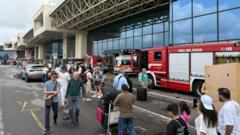The article text:
On Tuesday morning, Spain faced a nationwide telecommunications outage that left emergency phone lines incapacitated for several hours, intensifying concerns regarding the country’s infrastructure reliability. This incident follows closely on the heels of a major power blackout that had already caused considerable disruption earlier this month.
Telefónica, one of the country’s largest telecommunications companies, reported that a planned network upgrade had triggered the outage, affecting landlines and internet services the most. Important calls to Spain's national emergency number, 112, were rendered unreachable in various regions including Valencia, Aragón, and the Basque country.
In light of the outage, emergency services scrambled to respond by posting alternative contact methods on social media, addressing the urgent need for connectivity where traditional lines were down. Local authorities in areas like Catalonia and Extremadura acknowledged interruptions to their emergency services but assured that contingency plans were in place to handle emergencies. The Andalusian government also confirmed the outage, stating updates were being provided to restore services.
By the late morning, services were declared fully restored, and government officials expressed gratitude towards Telefónica for their swift resolution of the issue. Óscar López, Spain's minister of digital transformation, noted that his ministry had been in close communication with Telefónica throughout the incident, which incurred widespread connectivity issues across other major providers like Movistar, O2, and Orange, as reported by Downdetector.
This recent disruption comes on the heels of a separate, severe blackout in Spain and neighboring Portugal, where millions were left stranded, air travel halted, and businesses forced to close for up to 18 hours. Investigations are ongoing into the root causes of that blackout, which drew significant public backlash regarding the state of the country’s critical infrastructure, highlighting a growing unease about the reliability of services during emergencies.
As the nation grapples with these unfolding events, the spotlight remains on whether measures will be taken to fortify Spain's infrastructure against future failures.
On Tuesday morning, Spain faced a nationwide telecommunications outage that left emergency phone lines incapacitated for several hours, intensifying concerns regarding the country’s infrastructure reliability. This incident follows closely on the heels of a major power blackout that had already caused considerable disruption earlier this month.
Telefónica, one of the country’s largest telecommunications companies, reported that a planned network upgrade had triggered the outage, affecting landlines and internet services the most. Important calls to Spain's national emergency number, 112, were rendered unreachable in various regions including Valencia, Aragón, and the Basque country.
In light of the outage, emergency services scrambled to respond by posting alternative contact methods on social media, addressing the urgent need for connectivity where traditional lines were down. Local authorities in areas like Catalonia and Extremadura acknowledged interruptions to their emergency services but assured that contingency plans were in place to handle emergencies. The Andalusian government also confirmed the outage, stating updates were being provided to restore services.
By the late morning, services were declared fully restored, and government officials expressed gratitude towards Telefónica for their swift resolution of the issue. Óscar López, Spain's minister of digital transformation, noted that his ministry had been in close communication with Telefónica throughout the incident, which incurred widespread connectivity issues across other major providers like Movistar, O2, and Orange, as reported by Downdetector.
This recent disruption comes on the heels of a separate, severe blackout in Spain and neighboring Portugal, where millions were left stranded, air travel halted, and businesses forced to close for up to 18 hours. Investigations are ongoing into the root causes of that blackout, which drew significant public backlash regarding the state of the country’s critical infrastructure, highlighting a growing unease about the reliability of services during emergencies.
As the nation grapples with these unfolding events, the spotlight remains on whether measures will be taken to fortify Spain's infrastructure against future failures.




















